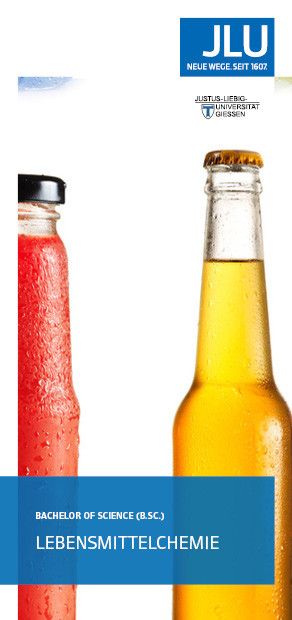Food Chemistry (B.Sc.)
Taught in German
Overview
- Overview
-
Subject Description
Food chemistry is a special component of the field of chemistry that deals with food, its ingredients, and its compositions as well as how foods can change due to environmental influences, preparation, production techniques, storage, and ageing, for example. Apart from that also the chemistry and analysis of cosmetics, utensils and animal feed is an integral part of the study of nutrition chemistry.
Subject-specific prerequisites
The first three semesters focus on the fundamentals of chemistry, biology, physics and mathematics; a previous knowledge of these subjects is certainly helpful. As the practical training forms a major part of this course of study, the student should have an interest in experimentation, a minimum of technical aptitude and enough stamina. Parts of the subject-specific literature are available only in English; therefore the prospective students should have an adequate knowledge of the English language or be willing to acquire appropriate skills as early as possible.
We strongly recommend participating in the preparatory course ‘mathematics’ that is offered to all first-year students of food chemistry. More on this...
-
Number of Students enrolled
117 students are enrolled in this bachelor's programme (winter semester 2017/18).Accreditation
since 10 December 2010.
Composition of the Study Programme
- Degree BSc
-
Degree
Bachelor of Science (BSc)
- Duration of studies 6 Semester 180 Credit Points (CP)
-
Duration of Studies
6 Semesters - 180 Credit Points (CP)
- Composition of Degree Programme
-
Composition of degree programme
The course of studies is characterised by a high degree of interdisciplinarity because students take courses from different faculties. The course of studies is subdivided into parts on chemistry, biology and food chemistry and also an instruction in the fundamentals of physics, mathematics, biology and data processing.
These basic sciences are taught together with general and inorganic chemistry in the first semester. Based on this, students will learn the fundamentals of organic, physical and analytical chemistry in the following semesters. These subjects are accompanied by several practical trainings in chemistry.
With the fourth semester the part of food chemistry gains more and more weight. The courses of food chemistry are mainly built on the fundamental chemical competences learnt in organic and analytic chemistry.
Nearly half of the workload of the sixth semester is taken up writing the bachelor’s dissertation/thesis. The student has to show that he/she is capable of working independently on an academic project.Structure of degree programme
1st semester 2nd semester 3rd semester General and Inorganic Chemistry (6 CP) Organic Chemistry of Materials (6 CP) Analytic Chemistry I (6 CP) Qualitative Analytics- Fresenius practical training (6 CP)
Inorganic Chemistry (Practical Training) (5 CP) Organic Chemistry II (4 CP)
Mathematics (7 CP) Thermodynamics and Electrochemistry (9 CP) Organic Chemistry (Practical Training) (10 CP) Physics for natural scientists (6 CP) Botany of economic plants (8 CP) Physical Chemistry (Practical Training) (5 CP) Biology (6 CP) Inorganic Chemistry II (advanced) (4 CP)
Basics of Data Processing (2 CP) 4th semester 5th semester 6th semester Food Chemistry I (13 CP)
Toxicology and Environmental Law (2 CP)
Food Chemistry III (7 CP)
Analytic Chemistry II (6 CP)
Food Chemistry II (12 CP)
Human Food of animal origin (5 CP) Physical Chemistry II (5 CP) Plant foods (6 CP) Elective 2 (6 CP) Biochemistry (4 CP) General and Molecular Microbiology (6 CP) Bachelor dissertation/thesis (12 CP)
Elective 1 (6 CP)
Application
- Commencement of Studies in the Winter Semester
-
Commencement of studies
Only possible in the winter semester
- Entrance Requirements Abitur ohne Praktikumsnachweis
-
Entrance requirements
- Applicants must have an Abitur (German school leaver's examination for university entrance) or equivalent. More on this...
- Certification of a pre-professional practical period is not required.
-
Special regulations apply to foreign applicants or those who gained their university-entrance qualifications abroad. Read more...
- Vorkurs Mathe
-
We strongly recommend participating in the preparatory course ‘mathematics’ that is offered to all first-year students of food chemistry. More on this...
- Application not limited only winter
-
-
Application / Enrolment
-
The study programme is not subject to admission restrictions.
-
The enrolment period for the winter semester begins at the beginning of June.
-
The end of the enrolment period is determined anew each year, please enquire in the application portal during the enrolment period.
Different rules apply in some cases for international applicants. More...
-
-
Career Options
- Career Options
-
Programmes of further study at JLU
Having finished the Master's programme students can embark on doctoral studies.
Career options / Job market
The job prospects for Bachelor graduates are still difficult to assess, as the vast majority of graduates go on to study for a Master's degree in food chemistry or a related course. However, experience shows that there are job opportunities in commercial laboratories and in the area of quality assurance in the food industry. In addition, the Bachelor's degree is particularly familiar to large companies with an international workforce. It is to be expected that Bachelor graduates will have an advantage where a solid basic education, a low age and practical knowledge that can only be acquired on the job are required.
The Bachelor's degree is recognised as a state intermediate examination (first examination section of the state examination for food chemists) and thus offers the possibility to continue the training to become a state-certified food chemist.More on this: Gesellschaft deutscher Chemiker (GdCH)
Further Information
- Further Information: Documents
-
PDF documents for the courses of study
- Flyer (in German)
- Study guide (in German)
Examination- and study regulations
- Special regulations (in German)
(with module descriptions and module plans) (in English)
(Please note that only the German version of the modules is offical and legally binding. The english Version is for informative purposes only.) - General study regulations for modular and multi-stage study programmes
Courses offered in the course catalogue
- Electronical course catalogue (in German)
- Bachelor's Degree Programmes of Faculty 08
- International pages
-
Please have a look at our International Pages for more information in English.
- Any Questions
-

Any Questions?
Information- and advisory services of JLU can be found under the category “contact” on this page!
- Help
-
Do you need assistance in choosing the right courses of study?
- Offers: Courses of study
-
Which courses of study suits me best?

Ask Justus offers information for prospective students
Events for prospective students

There is a whole range of events offered by JLU, current events can be found under “news”:
www.uni-giessen.de/studium (in German)
Contact
- Contact
- Subject Advisor
-
Prof. Dr. H. Zorn
Department of Food Chemistry and Food Biotechnology
Heinrich Buff Ring 17, 35392 Giessen
Phone: 0641 - 99 34900 (office), 99 34901 (secretary)
Office hours: by appointment
Email
- Central Study Advisor
- Anja Staffler
- Central Student Services
-
- Students office →
(for formal matters like matriculation) - Central student advisory office
(advice for students & prospective students) - Hotline Call Justus
(first contact for all matters pertaining to studies) - International office →
(for international students)
- Students office →

